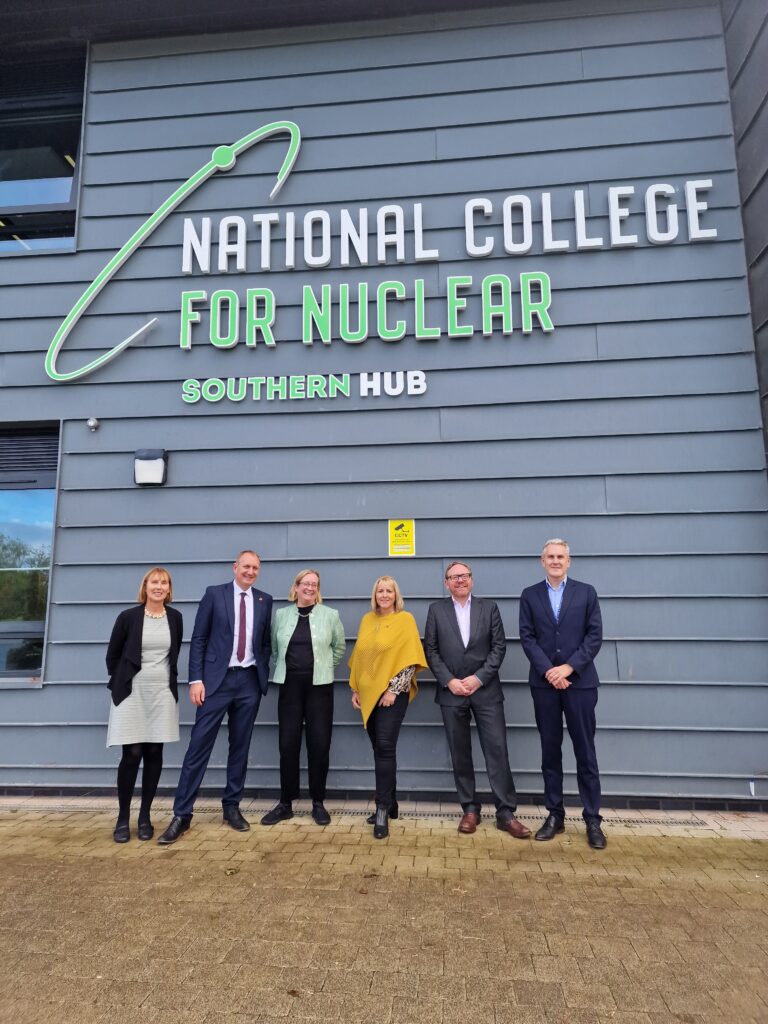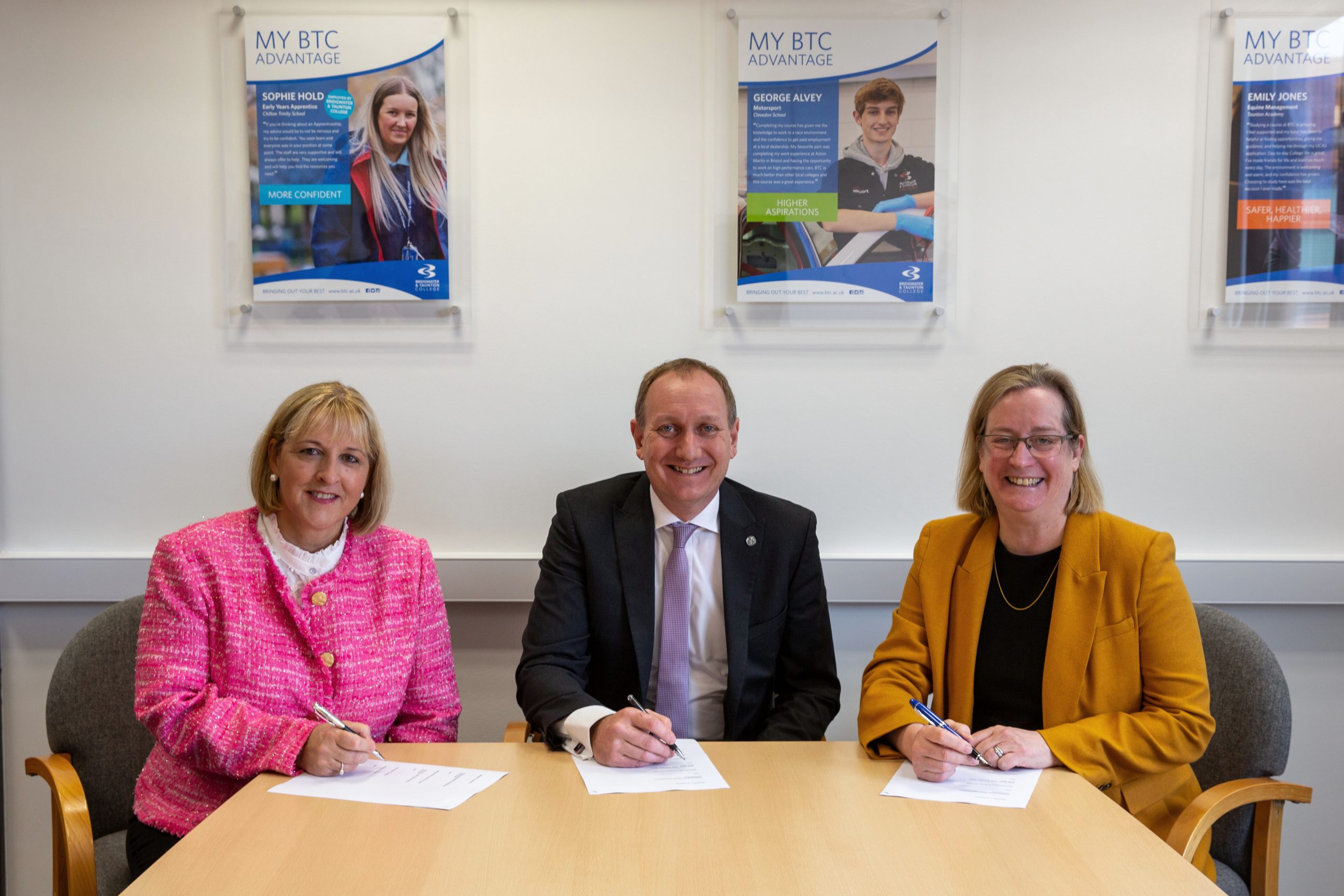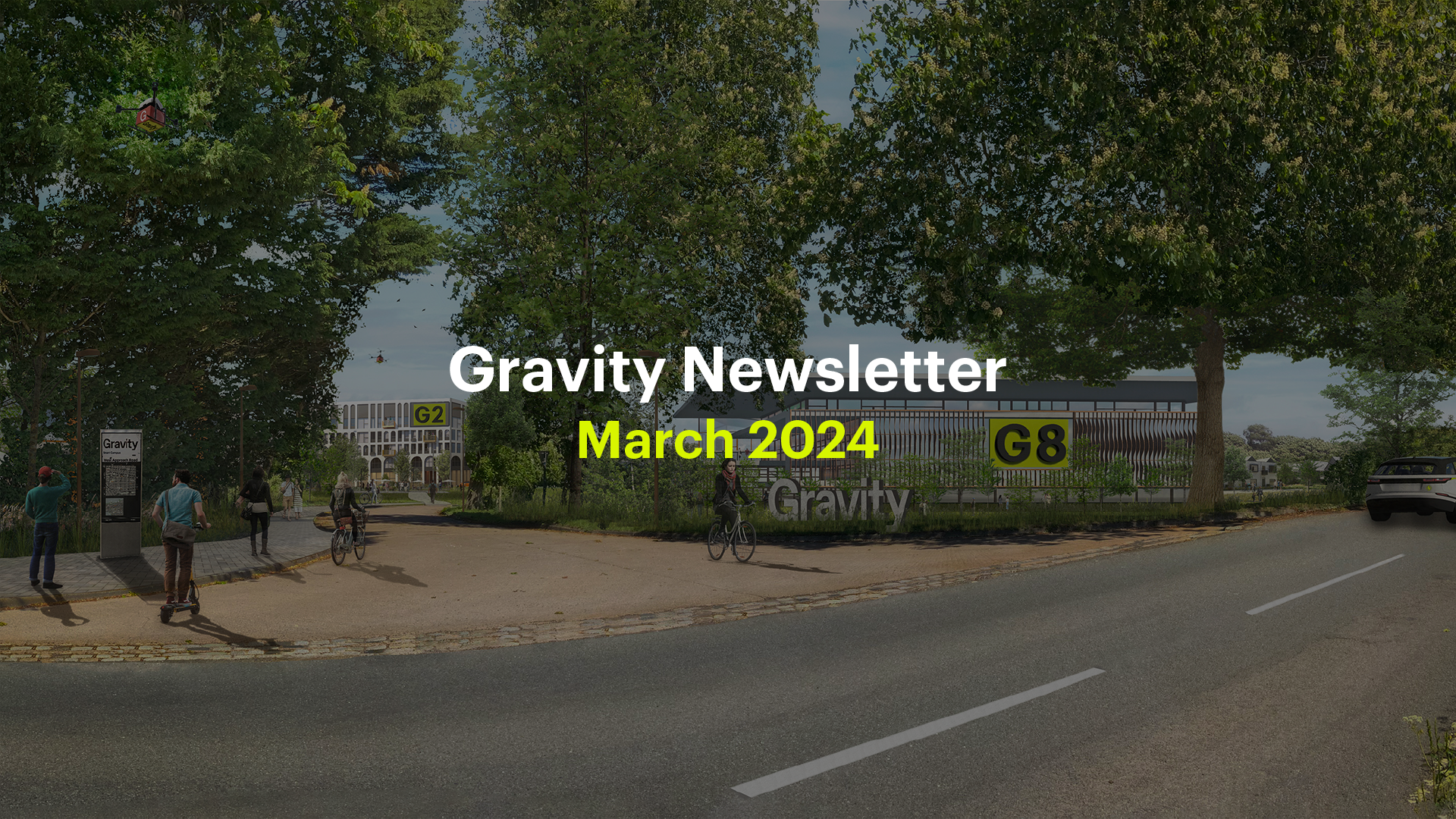In a move that signifies the commitment to advancing local workforce development, Bridgwater & Taunton College (BTC) and the University of Bristol convened in late October with the Gravity team to further explore and strengthen collaboration. This meeting was hosted at Gravity and the National College for Nuclear Southern Hub, located in Cannington, just west of Bridgwater. The national college signifies the excellent existing working relationship to prepare young people for careers in the nuclear sector.
Gravity is geared to host international business and accelerate responses to climate change, specifically around large-scale advanced manufacturing and transport decarbonisation, opening up new sectors and careers in energy management and electrification – all fundamental in the transition to a net zero economy.
The dialogue centered on BTC’s expertise and track record in employer engagement and the leadership role for Gravity on the workforce development strategy – aligning business needs to pathways to enable local people to connect to new training and job opportunities.
Gravity will facilitate research and development and new higher and further educational routes, creating exciting prospects for the University of Bristol to engage with and develop. The collaboration will leverage the complementary strengths of each institution to bolster Gravity’s workforce development strategy, ensuring a future-facing pool of talent for future occupiers at Gravity.
The University of Bristol’s delegation concluded their visit with a guided tour of the National College for Nuclear’s state-of-the-art facilities. As a next step, the parties agreed to establish a Memorandum of Understanding and to initiate a mapping of respective strengths and educational ‘offer’ to form a baseline from which to build. The parties agreed this was an essential first step to provide a platform for employer engagement to scope business need, and to working with other partners more widely on implementation.
This is Gravity, Director – Planning and Economic Development, Claire Pearce commented: “This partnership builds on the success of workforce development in the Bridgwater locality over the last 15 years with major employers and is of great significance to Gravity’s ambition of achieving its clean and inclusive growth strategy. Our Skills Charter mission is to ensure that local talent has ample opportunity to navigate through bespoke education pathways between the two institutions to secure high-quality jobs with future occupiers on Gravity.
Access to talent has always been one of Gravity’s key marketed attributes, we believe that the two institutions complement each other, from level 3 apprenticeships through to PhD’s and we are eager to see the fruits of their collaboration in workforce development, which will empower the South West to lead a strategic response. This initiative is crucial for developing new skills that will underpin emerging economic sectors”.
Bridgwater & Taunton College Principal and CEO, Andy Berry, commented: “We are looking forward to working in collaboration with the University of Bristol to deliver the innovative vision of Gravity, together we are leveraging our strengths and setting a new standard in education-to-employment pathways. It is a shining example of how local institutions can come together to build a formidable workforce for the future. Together we are meeting the immediate needs of our community and developing a robust model for sustainable growth to support the future workforce requirements of Gravity. We’re crafting a future where our students and local talent can benefit from this academic partnership, gaining skills that equip them to become ready for the challenges of a rapidly evolving world”.
University of Bristol Vice-Chancellor and President, Professor Evelyn Welch, commented: “We are delighted to be working with Gravity and Bridgwater & Taunton College. We see Gravity as a strategic opportunity and key gateway to progressive research and development aligned with addressing the climate emergency, and to enabling training and careers in energy futures. We look forward to working with new occupiers to understand their workforce needs and to develop solutions with the college. The University can support the college and help play a key role in linking to other higher education providers to ensure we optimise the collective strengths of the region”.
Attendees included: Vice Chancellor of University of Bristol, Professor Evelyn Welch; Pro Vice-Chancellor (Research and Enterprise) of the University of Bristol, Professor Phil Taylor; Director – Planning & Economic Development at This is Gravity, Claire Pearce; Principal & Chief Executive of Bridgwater & Taunton College, Andy Berry and Vice Principal – Strategy & Partnerships of Bridgwater & Taunton College, Matt Tudor, and Nicky Sendell- Vice Principal.
-END-
Gravity will be the UK’s first commercial smart campus and a blueprint for a ‘cleaner’, smarter future. It aims to attract the world’s most innovative companies working in the ‘clean growth’ sectors.
Expected to create up to 7,500 jobs, the 616-acre Enterprise Zone will be designed to shape connections between people and the places they work, supporting a culture of innovation and wellbeing. It will include diverse, flexible workspaces and resilient technologies along with enhanced transport links to, and within, the surrounding area.
Gravity has a Skills Charter which requires employment and skills plans for occupiers and there is an obligation for occupiers to work with BTC to focus on the recruitment and training of local people.
About Bridgwater & Taunton College
Bridgwater & Taunton College is located in the heart of Somerset, with campuses located Bridgwater, Taunton and Cannington. It is a chartered institute for education, which is a clear mark of excellence which shows potential new students and employers that an education provider is a centre of supreme quality in the areas of governance, leadership, professional development, teaching practice and community impact.
BTC is the lead on workforce development strategy for Gravity and will engage with occupiers and match local people to opportunities and training pathways.
Excellence is reflected in the number of prestigious, nationally recognised awards held, including a SEMTA award, TES FE Apprenticeship Programme of the Year Award, Lion Award, Queen’s Anniversary Prize and a TEF Silver Award.
About the University of Bristol
The University is ranked within the top 10 universities in the UK and 55th in the world (QS World University Rankings 2024); it is also ranked among the top five institutions in the UK for its research, according to analysis of the Research Excellence Framework (REF) 2021; and is the 4th most targeted university by top UK employers.
The University was founded in 1876 and was granted its Royal Charter in 1909. It was the first university in England to admit women on the same basis as men.
The University is a major force in the economic, social and cultural life of Bristol and the region, but is also a significant player on the world stage. It has over 20,000 undergraduates and over 7,000 postgraduate students from more than 150 countries, and its research links span the globe.





